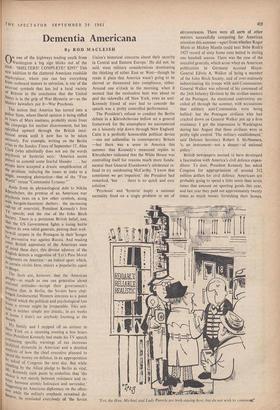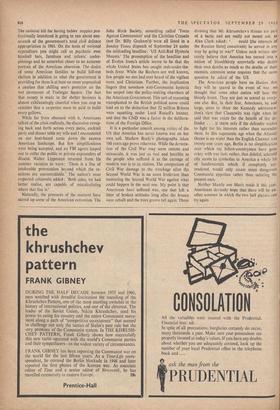Dementia Americana
By ROD MACLEISH ON one of the highways leading south from Washington a big sign blinks out of the dusk. 'SHELTERS! COMPLETE! $295!' This flew addition to the cluttered American roadside Marketplace, where you can buy everything from outboard motors to salvation, is one of the external symbols that has led a local variety Pf Britons to the conclusion that the United States is in the grip of War Hysteria or—as the blunter bewailers put it—War Psychosis.
The notion that America has turned into a PO lice State, where liberal opinion is being stifled In roars of Mars madness, probably stems from the campaign for nuclear disarmament, but has spiralled upward through the British intel- lectual strata until it now has to be taken seriously. For example. writing on the Berlin crisis in the Sunday Times of September 17, Alan Clark (who admittedly does not use the words Psychosis or hysteria) says : 'America seems Poised to commit some fearful blunder . . . her People have accepted a drastic simplification of the problem, reducing the issues at stake to a
gle, sweeping abstraction—that of the "Free world" versus "Communist Tyranny."'
Aside from its phraseological debt to Nikita khrushchev, the premise of an American war PsYchosis rests on a few other symbols, along with bargain-basement shelters : the increasing of reservists; President Kennedy's firm•V speech; and the rise of the John Birch neietY. There is a persistent British belief, too, 'Qat the US Government fights a losing battle 4gainSt its own rabid generals, pawing their wall- trci-wall carpets in the Pentagon in their hunger '13r Preventive war against Russia. And reading S7le British appraisals of the American state n, mind these days, this devout admirer of the rWish detects a suggestion of 'Let's Pass Moral ,Kgments on America'—an indoor sport which, `11 certain circles here, enjoys a popularity equal 1°1:Sing°. The facts are, however, that the American Pe°Ple—as much as one can generalise about national attitudes—accept their government's rertlise that, in Berlin, the Soviets have chat- beaged fundamental Western interests to a point feYond which the political and psychological loss trPm a retreat might be irreparable. This atti- „n,cle is neither simple nor drastic; in six weeks at home I didn't see anybody foaming at the ritotith.
IVIY family and I stepped off an airliner in York on a steaming evening a few hours 7ter President Kennedy had made his TV speech (taining specific warnings of tax increases ritical dynamite in America) and a detailed snalYsis of how the chief executive planned to ,Peend the money on defence, in an appropriation Ls't asked of Congress the next day. But while manding by the Allied pledge to Berlin as vital, ehr% Kennedy took pains to underline that 'the tr:31ce is not merely between resistance and re- s.cat. between atomic holocaust and surrender.' siuv4gesting an American diplomacy on the offen- te,,e while the milital-y emphasis remained de- "sive, he reminded everybody of `the Soviet
Union's historical concerns about their security in Central and Eastern Europe.' He did not, he said, want military considerations dominating the thinking of either East or West—though he made it plain that America wasn't going to be shoved or threatened into compliance, either. Around one o'clock in the morning, when it seemed that the motionless heat was about to peel the sidewalks off New York, even an anti- Kennedy friend of ours had to concede the speech was a pretty controlled performance.
The President's refusal to conduct the Berlin debate in a Khrushchevian bellow set a general framework for the atmosphere we encountered on a leisurely trip down through New England. Calm is a perfectly honourable political device —one not unfamiliar in contemporary Britain —but there was a sense in America this summer that Kennedy's measured replies to Khrushchev indicated that the White House was controlling itself for reasons much more funda- mental than General Eisenhower's celebrated re- fusal to try outshouting McCarthy. 'I know that sometimes we get impatient.' the President had remarked, 'but . . there is no quick and easy solution.'
'Psychosis' and 'hysteria' imply a national mentality fixed on a single problem or set of
circumstances. There were all sorts of other matters successfully competing for American attention this summer--apart from whether Roger Mans or Mickey Mantle could beat Babe Ruth's 1927 record of sixty home runs batted in during one baseball season. There was the case of the muzzled generals, which arose when an American publication in Germany accused Major- General Edwin A. Walker of being a member of the John Birch Society, and of over-zealously indoctrinating his troops with anti-Communism; General Walker was relieved of his command of the 24th Infantry Division by the civilian masters of the Pentagon. An emotional controversy un- coiled all through the summer, with accusations that military anti-Communists were being bullied; but the Pentagon civilians who had cracked down on General Walker put up a firm resistance. I got the impression in Washington during late August that these civilians were in pretty tight control. 'The military establishment,' said Defence Secretary Robert S. McNamara, 'is an instrument—not a shaper--of national policy.'
British newspapers seemed to have developed a fascination with America's civil defence expen- diture. To date, President Kennedy has asked Congress for appropriations of around 312 million dollars for civil defence. Americans are probably going to spend a little more than seven times that amount on sporting goods this year, and last year they paid out approximately twenty times as much money furnishing their homes.
'Yes, the lion, Michael and Lady Pamela are both staying here, but do not wish to comment: The national bill for having babies' nappies pro- fessionally laundered is going to run about one- seventh of the government's total civil defence appropriation in 1961. On the basis of national expenditure you might call us psychotic over baseball bats, furniture and infants' under- pinnings and be somewhat closer to an accurate portrait of the American obsession. The desire of some American families to build fall-out shelters in addition to what the government is providing for them is at least no more unpractical a caution that chilling one's posterior on the wet pavements of Trafalgar Square. The fact that money is made in the shelter business is almost exhilaratingly cheerful when you stop to consider that a carpenter must be paid to build every gallows.
While far from obsessed with it, Americans talked of the crisis endlessly, the discussion sweep- ing back and forth across every patio, cocktail party and dinner table my wife and I encountered on our heat-hazed route down the eastern American landscape. But few simplifications were being accepted, and no FBI agents leaped out to collar the public or private expounders of dissent. Walter Lippmann returned from his summer vacation to warn : 'There is a line of intolerable provocation beyond which the re- actions are uncontrollable.' The nation's most respected columnist added : 'Both sides, we had better realise, are capable of miscalculating where that line is.'
Naturally, the pressures of the moment have stirred up some of the American extremists. The John Birch Society, something called 'Teens Against Communism' and the Christian Crusade (not Dr. Billy Graham's) were all listed in a Sunday Times dispatch of September 24 under the misleading headline: `US Anti-Red Hysteria Mounts.' The presumption of the headline and of Evelyn Irons's article seems to be that the whole United States has caught reds-under-the- beds fever. While the Birchers are well known, few people we met had ever heard of the vigilant teens and Christians. Further, the implication lingers that somehow anti-Communist hysteria has seeped into the policy-making chambers of the American Government. This sort of reasoning transplanted to the British political scene could Lead on to the deduction that 52 million Britons were squatting under Lord Russell's banner, and that the CND was a factor in the delibera- tions of the Foreign Office.
It is a particular conceit among critics of the US that America has never known war on her own soil. Mathew Brady's photographs taken 100 years ago prove otherwise. While the devasta- tion of the Civil War may seem remote and minuscule, it was just as real and horrible to the people who suffered it as the carnage of modern war is to its victims. The comparison of Civil War damage to the wreckage after the Second World War is no more irrelevant than measuring the Second World War against what could happen in the next one. My point is that Americans have suffered war, one that left a litter of broken attitudes long after the houses were rebuilt and the trees grown tall again. Those divining that Mr. Khrushchev s threats are part of a tactic and are really not meant ask. as Alan • Clark asked : '. could [the interests of the Russian State] conceivably be served in any ' way by going to war?' Unless such writers sin cerely believe that America has turned into a nation of bloodthirsty screwballs who desire their own deaths as much as the deaths of their enemies, common sense requires that the same question be asked of the US.
The American people have no illusion that they will be spared in the event of war, no thought that some other nation will bear the bloody brunt. They are just as scared as every- one else. But, in their fear, Americans, by and large, seem to share the Kennedy administra- tion's view that Clausewitz was right when he said that war exists for the benefit of the de- fender . . . it starts only if the defender wishes to fight for his interests rather than surrender them. In this supersonic age when the Atlantic Ocean is no wider than the English Channel as twenty-one years ago, Berlin is no simplification over which my fellow-countrymen have gone crazy with war lust; rather, that doleful, schizoid city seems to symbolise in America a whole lot of fundamentals which, if completely sur- rendered, would only create more dangerous Communist appetites rather than satiating the present ones.
Neither Mantle nor Mans made it this year Americans devoutly hope that there will be an- other summer in which the two ball players can try again.







































 Previous page
Previous page